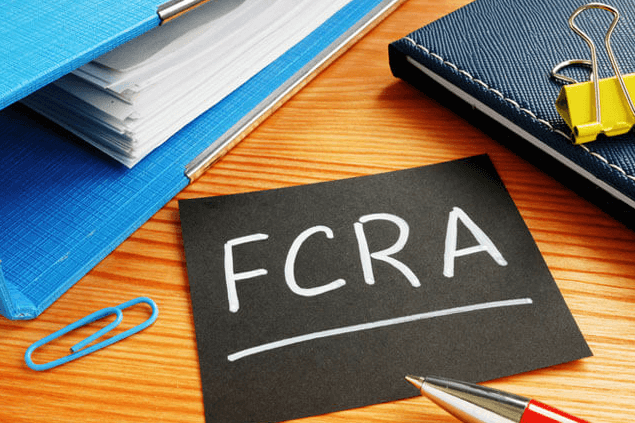All About FCRA Compliance Employers Should Know in 2022

Introduction
When an employer performs an employment background check on a candidate, it gives them access to the candidate’s personal information, which leaves them in a vulnerable position. The Fair Credit Reporting Act, more popularly referred to as the FCRA, was passed by the federal government in 1970 to ensure consumer information is protected and not used against them.
FCRA guidelines also ensure a candidate has a fair chance at employment unless there are limitations placed by the federal government. If you’re an employer and require a background check to ensure you hire the right candidate, learn more about compliance with the FCRA and other considerations in the subsequent sections.
What are the Responsibilities of FCRA?
The FCRA comprises various provisions in order to ensure no information, whether correct or incorrect, concerning the consumer is used against them. The primary responsibility of the FCRA is to ensure employers abide by the provisions set forth, which include the following:
- The consumer has the right to be informed and to give consent when an employer performs an employment background check.
- The consumer has the right to review the information compiled on the background check report. In case of any inaccuracies, they have the right to dispute the incorrect information.
- The consumer has the right to know when an employer decides to use their personal data in making employment-related decisions, such as withholding a promotion, not hiring them, or termination of employment.
Basic Requirements of FCRA Compliance for Employers
While performing employment background checks may be crucial for employers to ensure workplace safety and hire employees who meet their standards, here are the FCRA requirements for employers that must be taken into consideration when running a background check.
- Consent and Disclosure
A background check is considered legal only when the employer provides a written disclosure to the candidate, stating they intend to perform a check. Further, this document should be given to the candidate on its own and not with other documents, such as the orientation packet.
Besides written disclosure, employers are also required to obtain informed consent in the form of a signature and authorization of the background check from the candidates. This is to ensure that the candidate acknowledges the background check and gives permission for the same.
- Permissible Purpose
Employers can only perform background checks on employees or potential hires to determine if they’re the right fit for the position. Additionally, employers can perform routine checks, such as annual checks, to assess the recent findings since the completion of the initial report. Background checks are also permitted for employees being considered for promotions or a new position that involves greater responsibility.
- EEOC Guidance
As per the federal Equal Employment Opportunity Commission, employers cannot exclude or reject potential hires for job roles based solely on the record of their past criminal convictions or arrests. An exception to the rule is when the federal regulation forbids candidates with a criminal record from applying for or holding the job role that is in question.
- 2-Step Procedure of FCRA Compliance
When an employer decides against hiring, promoting, or retaining a candidate or an employee, they must issue a written notice called a ‘pre-adverse action notification’ to the candidate. The candidate should also be given a chance to explain the findings or refute them if they intend to do so.
- Results
Based on the results of the background check, an employer can make the final hiring decision and notify the candidates about the same once any disputed information is checked and corrected and the candidates receive the adverse action notification with the chance to respond to it.
5 Main Background Check FCRA Compliance Issues to Avoid
A background check is deemed legal only when you comply with the FCRA regulations. With that said, you can ensure FCRA compliance by avoiding the following issues:
- Impermissible Purposes
As already mentioned, the FCRA permits employment checks only for certain purposes, which include checking if the candidate is the right fit for the job or when an employer performs routine checks. Make sure that you consider the purpose of the background check and ensure it is permissible as per the FCRA regulations.
- Missing Consent
It is extremely crucial to take written consent from job applications for the background check before you perform one. You can take consent either via a signature or a digital equivalent. Further, while you can combine background check consent and disclosure in one document, the FCRA does not allow employers to include any other approvals or notices with these two documents.
- Failure to Share
While sharing screening results is optional in case employers do not plan to take an adverse employment decision, it is mandatory for you to share the background check screening report with the candidate along with the pre-adverse action notice and the Summary of Rights document if you intend to take an adverse action. This gives candidates the opportunity to review the report and clarify or explain the findings before an employer takes the final employment decision.
- Disclosure Error
Disclosure involves informing candidates that you intend to run a background check beforehand. It is very important that you inform your candidate about performing the background check via a disclosure statement and ensure you don’t mix the statement with other documents or present it in a manner that is not clear to the candidate.
- Failure to Inform the FCRA Rights
Candidates must be informed about the rights they possess when they receive and review the background check report. This is accomplished by sharing a copy of the FCRA Summary of Rights document with the candidate.
Bottomline The FCRA guidelines for employers are in place to protect the rights of candidates and ensure they are not discriminated against based on their criminal history. It gives candidates the right to clarify the findings of the background check and offers them a fair chance at employment. And since FCRA compliance failure can have serious repercussions for employers, it is best to ensure that the background check is performed in compliance with the FCRA guidelines.





